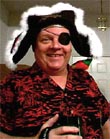|
|
This topic comprises 2 pages: 1 2
|
|
Author
|
Topic: "Boss's" ????
|
|
|
|
|
|
|
Gerard S. Cohen
Jedi Master Film Handler

Posts: 975
From: Forest Hills, NY, USA
Registered: Sep 2001
|
 posted 08-27-2003 11:58 AM
posted 08-27-2003 11:58 AM




The stylistic rule I learned in school was to form the possessive by adding an apostrophe plus the letter "s".
But words ending in "s" need only the apostrophe. However, there's the option of adding an apostrophe plus "s."
The apostrophe indicates missing letters. "John's book" was
originally written "John his book", so the apostrophe replaces letters "h" and "i."
"Boss" is awkward because of the double "s." In speech, we'd say "Boss-iz," and spelling it boss' seems to omit a pronounced syllable. In preparing a speech to be read, as on a tele-prompter, the apostrophe plus "s" might be preferred by the reader.
Incidentally, "boss" would be capitalized as the first word of a sentence, or as part of a name (Boss Tweed) or as a title in direct address (Right away, Boss!) but not in "My boss' daughter gives me a pain."
| IP: Logged
|
|
|
|
|
|
|
|
Bobby Henderson
"Ask me about Trajan."

Posts: 10973
From: Lawton, OK, USA
Registered: Apr 2001
|
 posted 08-27-2003 03:20 PM
posted 08-27-2003 03:20 PM




Grammatical atrocity is common in written and conversational forms of American speech. Many got their panties in a twist when Price Charles raised objections of how we were murdering the "King's English."
Here's the truth, America. Price Charles was right. Many of you are idiots. In true American form, we prefer to have our asses kissed rather than be told the truth.
"My Boss's Daughter" is yet another accepted example of wrongly used English. If I am going to write the possessive of "boss" I always write "boss'". I have to go round and round with signage customers when they want to put wrongly worded grammar on a lighted pylon sign. They reply, "but that just doesn't look right." I try to tell them the use is correct, but they want the wrong version instead. That has to be the motive for writing "boss's" in that movie title. They did it for looks.
I'm sure English teachers must be pulling out their hair when they take marks off a student's paper for splitting infinitives, writing run-on sentences and ending sentences in prepositions. The kids just come back with magazine articles and hardcover books by well-known writers that make all those mistakes. I personally did that in a couple of my junior high English courses. Then the teacher responds, "those writers are doing that for effect and you need to know the rules before you break them."
On occasion, some movies give me a good chuckle when it comes to the techical properties of English grammar. I like the scene in "Fight Club" where the airport baggage claim worker says, "in the event of a dildo we can never imply ownership of the dildo. We have to use the indefinite article, 'a didlo,' and never 'your dildo.'" The sad fact is most Americans have no clue of what "indefinite article" means.
| IP: Logged
|
|
|
|
Jeffry L. Johnson
Jedi Master Film Handler

Posts: 809
From: Cleveland, Ohio, USA
Registered: Apr 2000
|
 posted 08-27-2003 09:29 PM
posted 08-27-2003 09:29 PM





"A Manual for Writers of Term Papers, Theses, and Dissertations : fourth edition". Kate L. Terabian. ©1973 ISBN 0-226-81621-4.
POSSESSIVES
3:7 Form the possessive case of a proper name in the singular by adding an apostrophe and s:
- Jones's book
Stevens's poems
Kinross's farm
Marx's ideology
Diaz's revolt
Finch's candidacy
But see the exceptions noted below (3:8 and 9):
3:8 The possessive case of the names Jesus and Moses, and of Greek (or hellenized) names of more than one syllable ending in es, is formed by adding an apostrophe alone:
- Jesus' ministry
Moses' leadership
Aristophanes' plays
Xerxes' victories
3:9 For some common nouns as well, a regard for euphony sets aside the rule for forming the possessive by adding an apostrophe and s, and instead adds only an apostrophe:
- for conscience' sake
for righteousness' sake
for appearance' sake
3:10 Form the possessive case of a plural proper name (the Bradleys, the Costellos, etc.) by adding an apostrophe to the accepted form of the plural of the name.
- the Bradleys' house
the Costellos' ranch
the Rodriguezes' mine
the Finches' yacht
"The Macmillan Handbook of English : sixth edition". John M. Kierzek, Walker Gibson, revised by Robert F. Willson Jr. ©1977 ISBN 0-02-363040-X.
15. THE APOSTROPHE
15a. An apostrophe and -s are used to form the possessive of a noun, singular or plural, that does not end in -s.
15b. The apostrophe alone is used to form the possessive of a plural noun ending in -s.
15c. The apostrophe with -s is used to form the possessive of singular nouns ending in -s, if the resultant form is not unpleasant or difficult to pronounce.
EXAMPLES
James's hat, Keats's poems, Jones's office; but: for goodness' sake, for conscience' sake, Demosthenes' orations.
| IP: Logged
|
|
|
|
|
|
|
|
|
|
|
|
|
|
All times are Central (GMT -6:00)
|
This topic comprises 2 pages: 1 2
|
Powered by Infopop Corporation
UBB.classicTM
6.3.1.2
The Film-Tech Forums are designed for various members related to the cinema industry to express their opinions, viewpoints and testimonials on various products, services and events based upon speculation, personal knowledge and factual information through use, therefore all views represented here allow no liability upon the publishers of this web site and the owners of said views assume no liability for any ill will resulting from these postings. The posts made here are for educational as well as entertainment purposes and as such anyone viewing this portion of the website must accept these views as statements of the author of that opinion
and agrees to release the authors from any and all liability.
|

 Home
Home
 Products
Products
 Store
Store
 Forum
Forum
 Warehouse
Warehouse
 Contact Us
Contact Us




 Printer-friendly view of this topic
Printer-friendly view of this topic















![[evil]](graemlins/evil.gif)

![[Big Grin]](biggrin.gif)

![[Roll Eyes]](rolleyes.gif)



